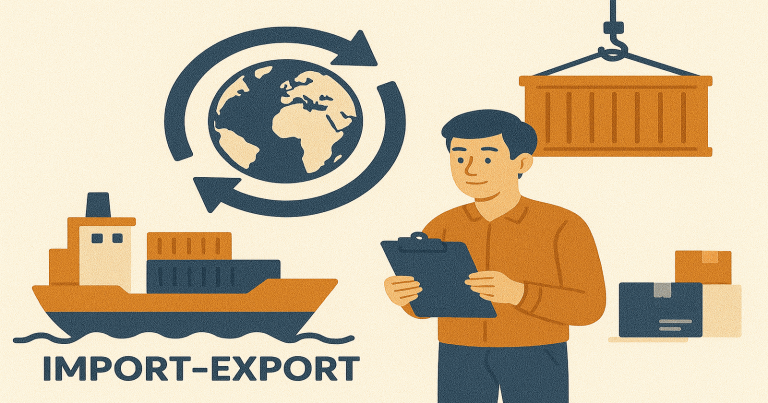An import-export business refers to the sale of goods produced in other countries (import) in your country or selling domestic products to overseas markets (export). This kind of business enables one to maximize their use of the international market by offering products that are perhaps not easily accessible at home or by reaching customers abroad. Global trade would not be complete without it, and the world economy would not work the same way. Use this article to step into the import export business and begin building your international presence by following its steps.
What is Import Business?
An import business is the importation of goods and services from foreign countries to your own country for resale or personal use. Importing is vital to businesses looking to access products that are not locally manufactured or have higher demand than locally available products. Import businesses are intermediaries between foreign producers and local consumers or markets that ensure global products reach local markets.
The main objective of importing goods in the import-export business is to take advantage of cheaper manufacturing costs or unique products that are not available in the country. For instance, an importer in India may import electronics from Japan since those electronics are popular in the local market and heavily priced.
Pros and Cons of Import Business
The Import Export Business has its advantages and disadvantages. While it offers opportunities for growth and expansion, it also comes with particular challenges.
| Pros | Cons |
| Cost Savings: Lower expenses from cheaper products. | Dependence on Foreign Markets: Risk of supply chain issues. |
| Product Variety: More product choices for customers. | Regulatory Hurdles: Complicated rules and tariffs. |
| Global Networking: Strong international relationships. | Shipping Delays: Longer delivery times. |
| Market Demand: Stay competitive with in-demand products. | Increased Costs: Higher costs due to shipping and taxes. |
What is Export Business?
An export business refers to the sale of goods and services produced in your country to consumers or other businesses in another country. Exporting allows companies to access worldwide markets, increase their customer size, and subsequently improve their profit-making abilities by making their products available on the international market. An Indian textile firm can export apparel to the United States, or a software firm may export digital services across the world.
Pros and Cons of Export Business
Export businesses, like import businesses, have their own set of advantages and disadvantages that need to be carefully evaluated.
| Pros | Cons |
| Increased Market Reach: Expands to international markets for a more extensive customer base. | High Costs: Significant expenses for logistics, tariffs, and documentation. |
| Higher Profit Margins: Secures higher selling prices in foreign markets. | Risk of Non-Payment: Risk of customers not paying for goods or services. |
| Economic Growth: Contributes to economic development by increasing foreign exchange and employment. | Legal and Regulatory Issues: Compliance with varying international trade laws. |
| Product Diversification: Allows businesses to diversify and experiment with new products. | Cultural Barriers: We need to understand cultural nuances for successful sales and partnerships. |
How to Start Import Export Business?
Starting an import and export business can be very rewarding, but not without proper planning and strategizing. Here are the steps that will help you get started in your import export business:
- Market Research: Thoroughly research the demand for specific products in your target markets, be it imports or exports. Know the trends, consumer preferences, and competitors in the market.
- Choose your Niche: You can go for a niche such as electronics, textiles, or an agricultural product. The uniqueness of a niche helps in building up a brand entity.
- Legal Formalities: The company should first be registered before the authorities and, among those, before such authorities, like in India’s Directorate General of Foreign Trade. For all intents and purposes in international trade, an Importer Exporter Code number will require registration.
- Know the export/import regulations: Understand the laws, tariffs, and regulations in both your country and your target country, which may regulate importing and exporting goods into that country. Sometimes, you must obtain certification or licenses, depending on the type of sound you are trading.
- Develop supplier and buyer networks: Establish connections with other suppliers or potential buyers either regionally or in an international network using the same sites, shows, marketplaces online, and business listings, among other similar lists and directories.
- Logistics and Shipping: Plan the shipping methods, service for freight forwarding, and the regulations followed while shipping the products. The goal here should be the best rates and efficient on-time delivery to satisfy the customer.
- Financial Planning: Include shipping costs, duties, taxes, and other operational expenses in the plan. Establish an effective payment method for international transactions.
Import Export Business FAQs
1. What is the difference between an import and an export business?
There are import businesses that import goods from other foreign countries to sell in the local market and export businesses sell domestic goods to foreign markets.
2. How can I start an import export business in India?
Starting an Import Export Business To begin with, one needs to go about getting the DGFT registrations and IECs, followed by fulfilling all such legal rules applicable in India relating to trading in foreign states.
3. What are the significant challenges of the import export business?
Currency fluctuations, customs regulations, shipping delays, and supply chain logistics.
4. How can I find suppliers for my import export business?
You can find suppliers on online B2B platforms, trade fairs, or through contacting trade associations and embassies for good contacts.
5. Is the import export business profitable?
It is a very lucrative business if the right products are chosen, proper logistics management is done, and the international demand is understood.


